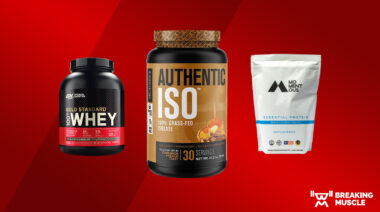What Is Protein?
- Protein is primarily found in animal and dairy products.
- Protein enhances muscle mass, strength, endurance, muscle recovery, and power.
- Decreases inflammation and muscle protein breakdown.
First off, let’s talk about the recommended dietary allowance (RDA) for protein. The current RDA is a modest 0.8 grams of protein per kilogram of body weight.
The RDA is established as the amount of a nutrient you need to meet your basic nutritional requirements. Essentially, it’s the minimum amount you need to keep from avoiding sickness—not the specific amount you’re supposed to consume each day.
For example:
- For a 140-pound person, that means about 50 grams of protein each day.
- For a 200-pound person, that means about 70 grams of protein each day.
Reasons To Eat More High-quality Protein Daily
- Muscle growth
- Strengthens bones
- Hormone regulation
- Aids in quicker recovery
- Supports lean mass gains
- Suppresses appetite and promotes satiety
- Prevents chronic ailments associated with aging
- Protects the immune system against illness and injury
- Aids in weight loss during times of energy restriction
Let’s talk about why you need more protein. As you can see, the bullet list explains the reasons that protein is essential. As a registered dietitian nutritionist and fitness professional, I find the RDA to be quite confusing to the general public, athletes, and coaches.
To be honest, even dietitians can’t seem to agree on what to recommend for protein to their clients, patients, and athletes.
So if there is a misunderstanding among the food and nutrition experts, there’s likely a misunderstanding across multiple populations. Especially young children, athletes, and the elderly have a greater need for more protein.
Is More Protein Better?
The Protein Summit reported in a special supplement to the June issue of The American Journal of Clinical Nutrition (AJCN) that Americans may eat too little protein, not too much. Eating more protein can help provide the whole package.
That means that a byproduct of consuming more protein is you’re getting other great nutrients such as B-vitamins, carbohydrates, minerals, and healthy fats that offer the complete package.
Naturally, when you consume more protein, you will typically consume less low-quality foods like simple or refined carbohydrates that people typically turn to when they’re hungry. Sweets, cookies, white bread, and pastries won’t offer the healthy nutrition you’d get from a high-quality protein source.
These are just a few of the high-quality protein sources out there. Most animal sources of protein such as:
- Meat
- Dairy
- Fish
- Chicken
These examples of high-quality protein sources offer all essential amino acids in proportion needed by the human body.
While plant-based proteins such as vegetables, nuts, beans, and grains often lack one or more of the essential amino acids.
That does not mean you should only consume animal products to attain your essential amino acids because you can utilize soybeans and quinoa, which contain all nine essential amino acids needed. Click here for a complete list available if you’re interested in plant-based proteins.
Athletes and Protein Needs
Even athletes have higher needs. Provided the remodeling process of muscle proteins, there is a much higher turn over rate as a result of higher training volumes.
- Specifically, in track and field athletes, it would be wise to consume roughly 1.6 grams per kilogram of body mass each day if their goal is to increase muscle and prevent muscle breakdown.
- A proper target protein intake should be between 1.6 and 2.4 grams per kilogram of body mass per day, as cited in recent findings in a consensus statement on Sports Nutrition for Track and Field Athletes. A summary of the review can be accessed here.
The International Society of Sports Nutrition Position Stand on protein and exercise provides an objective and critical review related to the protein intake for health and fitness-oriented individuals. For building muscle mass and maintaining muscle mass:
- The overall protein intake of 1.4-2.0 g/kg body weight/day (g/kg/d) is enough.
- There is evidence to support (3.0 g/kg/d) to support positive effects on body composition in strength-trained athletes to promote lean mass gains.
- It is optimal to spread out protein intake between 20-40 g/meal throughout the day.
- As a registered dietitian nutritionist, I strive to consume (2.0 g/kg/d) to support my health and performance goals.
I encourage all of my clients and athletes to consume more protein. Especially if you’re trying to increase lean mass and strength gains, the higher protein will not make you fat. It will help support a healthy body and make you feel more satisfied.
Older Adults and Protein
Older adults are fighting off the accelerated loss of muscle mass and function that is associated with aging, referred to as sarcopenia. For every decade after 40 years old, you lose 8% of muscle mass, and it increases to 15% after 70 years of age.
Older adults should strive to consume 1.5 to 2.0 grams of high-quality protein per kg of body weight per day, according to an article by the Center of Aging. Up to one-third of older adults don’t eat enough due to reduced appetite, impaired taste, swallowing difficulties, and dental issues.
During the aging process, the body is less efficient and struggles to maintain muscle mass and strength along with bone health and optimal physiological function, which warrants a greater need for protein.
Protein Summary
Eat more high-quality protein. It won’t make you fat, harm your kidneys or bones. It will support lean tissue gains and help you recover overall while fighting age-related muscle loss, especially if you’re a female athlete, aging adult, male, or in general, human with a beating pulse.
That’s a joke, but really If you have questions about eating more protein or how to implement higher-quality sources into your diet, email me and let’s have a conversation.






